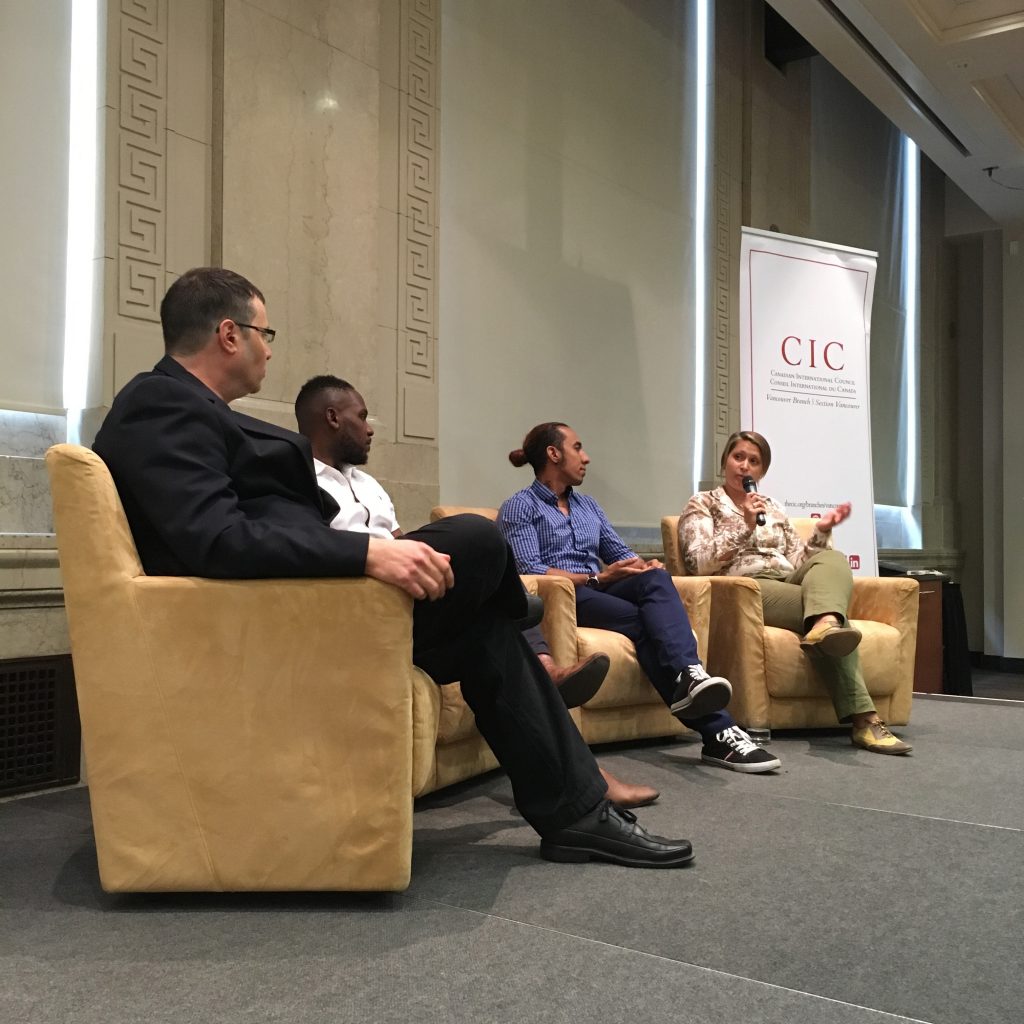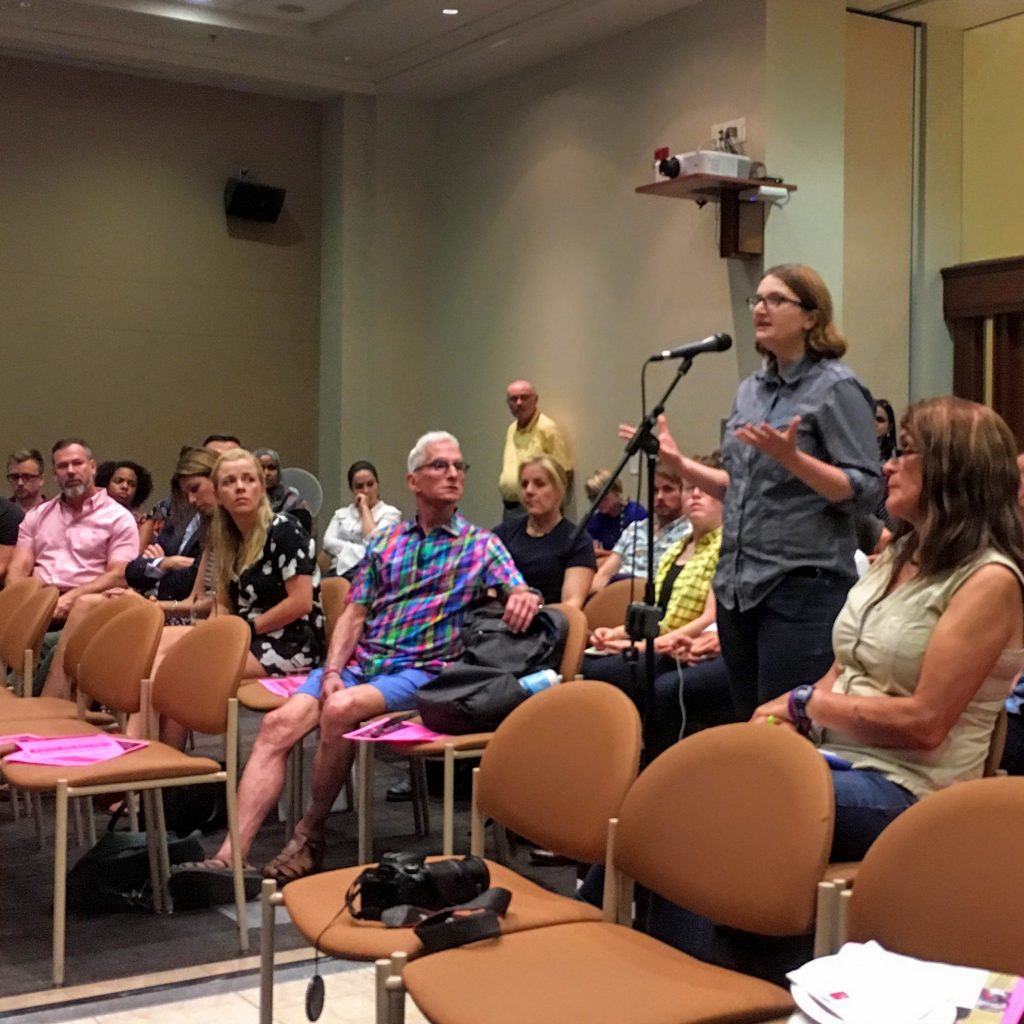Vancouver Pride Society (VPS) together with the Canadian International Council (CIC) hosted an event this Thursday at SFU’s Segal Graduate School of Business. It brought the local community together for a discussion on LGBT+ Refugees. Foundation of Hope attended the event thanks to TD Bank as an important sponsor.
This inaugural discussion was led by panelists that included Kimahli Powell, Executive Director of Toronto’s Rainbow Railroad as well as Sharalyn Jordan and current inland Refugee claimant Rainer Oktovianus (Indonesia), both of Vancouver’s Rainbow Refugee. These are organizations that FOH is proud to support for their ongoing work.
Kimahli opened the discussion by pointing out that 72 countries criminalize homosexuality, further punishable by death in eight of them. This is strongly correlated with fundamental religious views. Jamaica, for example, has the most churches per capita, which has bred a culture of fear such that Jamaica is particularly intolerant to alternative forms of sexuality and gender identity expression. Elsewhere in the world, raids and detentions are ongoing, such as in Indonesia, which Rainer also pointed out as having the world’s largest Muslim population.
Starting out as a patchwork of concerned citizens in the Greater Toronto area, Rainbow Railroad’s name pays homage to the Underground Railroad that was seminal in the emancipation of African-American slaves in the United States during the 19th Century. Kimahli acknowledged that although human rights defenders exist across the world and throughout countries of LGBT+ persecution (and thankfully so), Rainbow Railroad decides to intervene on the most acute cases of urgency. In 2016, the organization relocated 81 people to safety, but that number has already increased to 118 so far in 2017. It currently averages around 90 persons per year.
Vancouver’s Rainbow Refugee started out as a movement to address inland Refugee claims, which involved Asylum Seekers looking to stay in Canada under humanitarian and compassionate grounds. Sharalyn noted that the route to asylum has become more difficult in Canada, particularly due to immigration reform under the previous government (2012). Rainbow Refugee is working steadily with the Immigration and Refugee Board of Canada (IRB) to better recognize the unique sensitivities and vulnerabilities of the queer population.
According to Rainer, most Indonesians live in poverty and this is a major constraint for those seeking asylum. Refugee claimants must apply out of country where they are not legally able to work. Processing times also make it a non-starter for most impoverished LGBT+ Indonesians. Those that do manage to get to Canada can be faced with the Canada Border Services Agency (CBSA) response that is abrupt, unforgiving to inland Refugee claimants, and overall discouraged, since it can take years for IRB hearings to occur. Rainer has also observed that Canada has a serious issue with racism and mental health stigmas.
Sharalyn noted these timelines for hearing have become untenable since the 2012 overhaul of the IRB’s inland refugee system. Internally, IRB’s own deadlines cannot be met and hearings regularly get cancelled or postponed amounting to losses of thousand of dollars to the individual cases. A global trend of anti-LGBT+ spikes occurring in Russia, Uganda, Chechnya, Kenya, and most recently Nigeria are troubling. Of the global total, 84% of Refugees are currently sustained in the global South in places like Kenya, with wait times of 4-7 years. The Ugandan Refugee crisis principally resulted from the criminalization of homosexuality in 2014. LGBT+ Ugandans that have sought asylum in Refugee camps in Kenya get outed the moment they speak. Imagine facing persecution from within a Refugee camp!
Kimahli was quite intent to note the role of Rainbow Refugee as a national and global champion for the movement to address these issues, duly acknowledging founder Chris Morrissey and her tireless work. Speaking from the audience, Chris added an important gender lens to the discussion. She pointed out that lesbians face additional barriers including less opportunities for travel, since women require men to accompany them in some countries. Similar issues exist for trans folks that must decide on which gender identity is most safe to use. Overall, much of the focus is on gay men such that lesbians become invisible. Sharalyn acknowledged CIC as having an influential role to help with gender-based violence and persecution.
Kimahli also made an appeal to the CIC, pointing to the current migration corridor in Montréal welcoming Asylum Seekers entering Canada from the United States. They cannot otherwise claim Refugee status due to the Safe Third Country Agreement between Canada and the U.S. Kimahli notes the movement to establish a migration corridor as reactionary and emblematic of the systemic flaws in the Canadian process for safe and effective migration, which appears to be incongruent with Canadian values.
If influential politicians like Global Affairs Minister Chrystia Freeland are as “concerned” as they claim, the feds need to live up to the commitments made to the LGBT+ community. The most recent decision to cut legal aid services has now left Refugee claimants in Canada with yet another financial barrier to migration. The issue should be brought to the forefront of the discussion and FOH volunteer and immigration legal expert Aleksanda Djordjevic inquired about how it will affect the panel’s mandates.
The general consensus is that there is a need to press for urgent action from the federal government. And so long as it remains a hot topic, it seems time is of the essence to address these issues as a collective. From Vancouver to Halifax, there are enough organizations across Canada working in collaboration to appeal to the Government of Canada through some form of coalition. This just might be what it will take to invoke meaningful action that can lead to positive and lasting migration reforms accessible to persons seeking asylum or Refugee claims from persecution on the basis of sexual orientation and gender identity expression across the world.



Leave a reply